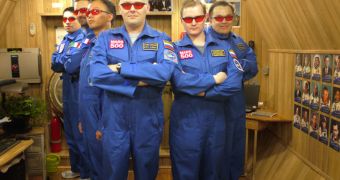Pseudo-astronauts living in a series of interconnected metal cylinders in Russia have now spent more than a year in solitary confinement. They are replicating the exact conditions of a round-trip to Mars.
The experiment, called Mars500, is meant to provide scientists and psychologists with an insight into how the human mind would bear spending that much time in isolation, within the confines of a very limited group of people.
There are six astronauts in the experimental facility, which is located at the Institute for Biomedical Problems, on the outskirts of the Russian capital, Moscow. Three of them are from the Russian Federation, two were recruited by the European Space Agency, and one is from China.
All of them were closed inside a series of modules exactly one year ago. Their new home consists of about the same modules that would be needed to travel to Mars and back, and is adjacent to a chamber emulating the surface of Mars.
Theoretical studies based on current space technologies indicated before the study that it would take at least 18 months for a round-trip to Mars to be over. This includes the actual travel, plus spending some time on the surface of the planet, doing scientific work.
The crew of the Mars500 experiment got through the first leg of the travel, and also managed to “land” on the Martian surface. After conducting experiments for a few days, they entered the spacecraft yet again, and are now on their way back home.
ESA estimates that the experiment will be concluded sometime in the autumn. The crew arrived at Mars in late January 2011, and remained there until March 2, when they departed for Earth.
The simulation they are in is so realistic that it even has a built-in communications delay. Astronauts traveling to Mars would experience the same effect, due to the distance they are from Earch.
“Wow, it’s already been a year. One way to visualize it is if you think of what you were doing exactly one year ago, and then picture yourself living in a windowless metal box from then!” says ESA crew member Diego Urbina.
“The dark side of this routine is that every day for the past year we woke up at the same time to do the same medical controls with the same devices: no weekend or holiday breaks for a year!” adds fellow ESA crew member, Romain Charles.
“We still have 5 months ahead of us a lot of opportunities to make this trip to Mars even more special,” says Romain, adding that the trip back home is scheduled to end on November 5.

 14 DAY TRIAL //
14 DAY TRIAL //